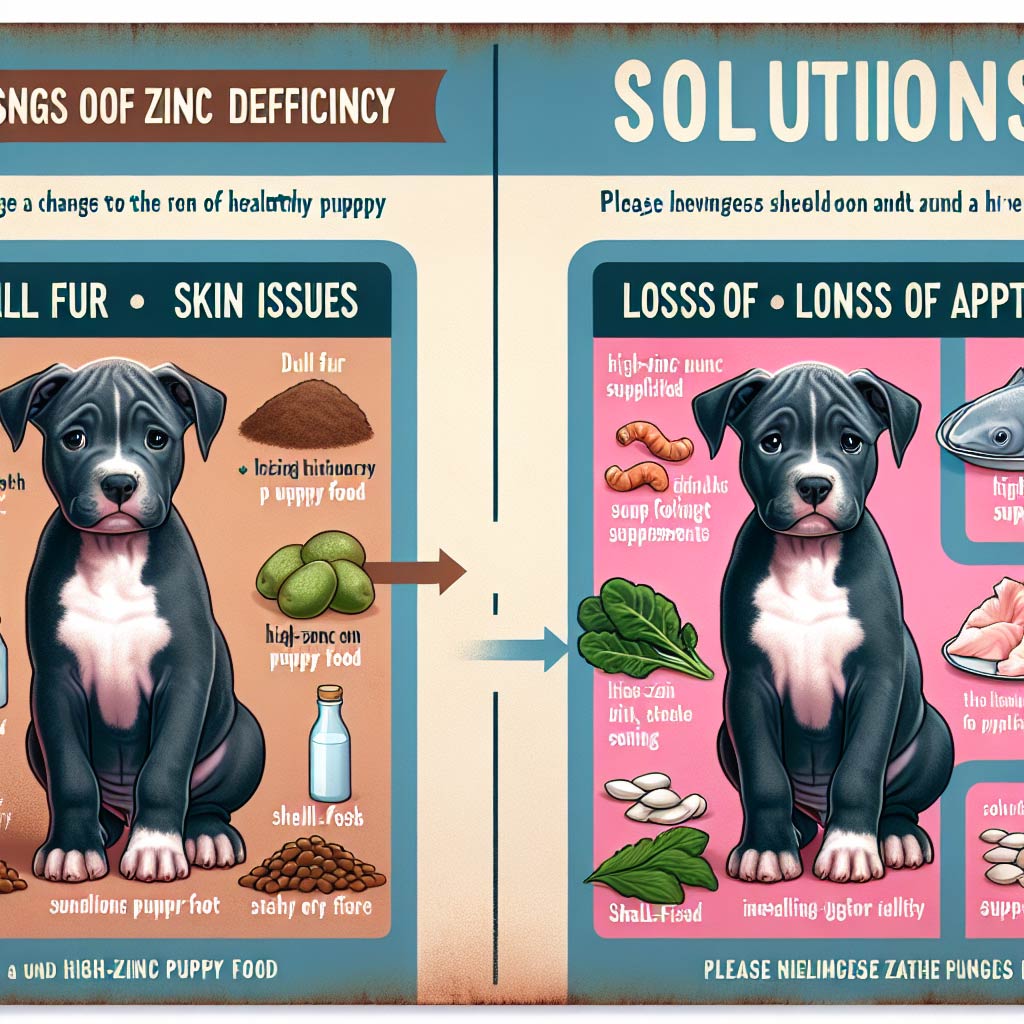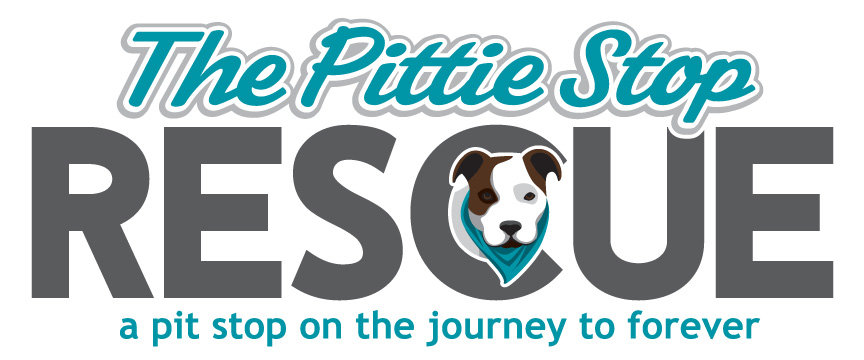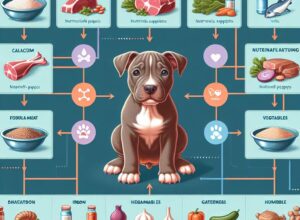
Zinc Deficiency in Pitbull Puppies: What You Need to Know
As a devoted pet owner, you’re always on the lookout for your furry friend’s health and happiness. But did you know that zinc deficiency is a common issue that can affect your pitbull puppy’s well-being? It’s a sneaky problem that can cause a range of symptoms, and it’s essential to catch it early. Let’s explore what zinc deficiency looks like in pitbull puppies and how you can address it effectively.
Key Takeaways
- Zinc is crucial for your pitbull puppy’s growth, immune function, and overall health.
- Signs of zinc deficiency include hair loss, lethargy, and slow wound healing.
- A balanced diet is key to preventing zinc deficiency.
- If you suspect a deficiency, consult your vet for a proper diagnosis and treatment plan.
- Too much zinc can be harmful, so it’s important to follow professional guidance when supplementing.
Signs Your Puppy Might Be Zinc Deficient
It’s not always obvious when your pitbull puppy isn’t getting enough zinc. But there are red flags you can watch for. Frequent infections, a dull coat, and lack of energy are all signs that something might be off. If your puppy has thickened footpads or red, weepy skin between their toes, it’s time to take a closer look. These symptoms could indicate a zinc deficiency that needs your attention.
Understanding the Role of Zinc in Puppy Health
Zinc is more than just a mineral; it’s a vital component in over 300 enzymes that support your puppy’s body functions. From DNA synthesis to protein digestion, zinc is a multitasker that keeps your pitbull puppy’s body running smoothly. It’s especially important for growing puppies, as it helps with proper development and disease resistance. Without enough zinc, your puppy might not only look unwell but could be more vulnerable to illnesses.
Zinc’s Vital Role and Why Your Pitbull Pup Needs It
Imagine zinc as the unsung hero in your pitbull puppy’s body, quietly working behind the scenes to support their growth and health. It’s involved in everything from hormone production to wound healing. When your puppy doesn’t get enough zinc, their body can’t function at its best. This can lead to a host of problems, from weak immunity to poor growth. Ensuring your pitbull puppy gets enough zinc is a critical part of their care.
Functions of Zinc in a Growing Puppy
Zinc is a powerhouse mineral that punches well above its weight in a growing puppy’s body. It’s a key player in the development of strong bones and teeth, which is crucial for your playful pitbull pup. Zinc also helps maintain a shiny coat and healthy skin, so if your puppy’s fur is looking less than lustrous, a zinc check might be in order. Plus, it aids in the function of the immune system, keeping your puppy ready to fend off any sniffles or scratches they might encounter on their adventures.
Zinc Deficiency: Recognizing the Risks
Understanding the risks associated with zinc deficiency can help you keep your pitbull puppy healthy and thriving. Some risks are more obvious, like poor growth or a weakened immune system. However, there are also hidden dangers, such as the potential for more severe health issues down the road if the deficiency isn’t corrected. These can include chronic skin conditions or even reproductive problems. Being aware of these risks is your first line of defense in protecting your puppy’s health.
Spotting the Symptoms: Is Your Pitbull Puppy at Risk?
It’s crucial to be vigilant for the signs of zinc deficiency in your pitbull puppy. While some symptoms are clear-cut, others can be subtle and easily overlooked. By knowing what to look for, you can catch a potential deficiency early and take steps to correct it before it impacts your puppy’s health and happiness.
Physical Indicators of Zinc Deficiency
Physical symptoms are the most noticeable signs that your puppy might not be getting enough zinc. Look out for a coat that’s lost its shine or patches of hair loss. You might also see crusty or scaly skin, particularly around the eyes, mouth, and ears. In more severe cases, your puppy might have diarrhea or display slow wound healing. These are all red flags that your pitbull puppy could be zinc deficient.
Behavioral Changes That Suggest a Possible Zinc Deficiency
Behavioral changes can also signal a zinc deficiency in your pitbull puppy. If your normally energetic pup is showing less interest in playtime or seems unusually lethargic, take note. A decrease in appetite or sudden weight loss can also be cause for concern. While these symptoms could be related to a variety of issues, they should prompt a conversation with your vet to rule out zinc deficiency as a possible culprit.
Diagnosis and Treatment: Getting Professional Help
If you suspect your pitbull puppy might be zinc deficient, it’s crucial to seek professional help. Self-diagnosing and treating could lead to more harm than good. Your vet can conduct the appropriate tests and provide a treatment plan tailored to your puppy’s specific needs. Remember, timely intervention can make all the difference in your puppy’s recovery and future health.
Getting the Right Diagnosis: Tests and Vet Visits
When you visit the vet, they’ll likely perform a physical examination and review your puppy’s dietary history. They may also recommend blood tests to measure zinc levels and rule out other conditions with similar symptoms. In some cases, a skin biopsy might be necessary. It’s important to provide your vet with as much information as possible to ensure an accurate diagnosis. Once confirmed, your vet will discuss the best course of action for your puppy’s zinc deficiency.
Treating Zinc Deficiency: Diet and Supplements
Treatment for zinc deficiency typically involves dietary adjustments and, if necessary, supplements. Your vet will recommend a diet rich in zinc or a specific supplement regimen. It’s vital to follow their guidance closely, as too much zinc can be toxic. They might also suggest follow-up visits to monitor your puppy’s progress and adjust the treatment plan as needed. With the right care, most puppies bounce back quickly from zinc deficiency.
Preventing Zinc Deficiency: Proactive Measures
Prevention is always better than cure, especially when it comes to your pitbull puppy’s health. By taking proactive steps, you can minimize the risk of zinc deficiency and ensure your puppy grows up strong and healthy. Let’s look at the best practices to keep your puppy’s zinc levels in check from the get-go.
Best Dietary Practices for Pitbull Puppies
A balanced diet is the cornerstone of preventing zinc deficiency. Ensure your puppy’s food contains adequate levels of zinc, which is often included in high-quality commercial dog foods. If you opt for homemade meals, consult with a veterinary nutritionist to create a balanced diet plan. Foods rich in zinc, like meat and certain seafood, can be beneficial. Remember, variety is key to covering all nutritional bases, so mix it up and keep your puppy’s meals diverse and nutrient-dense.
Supplementing Zinc: How Much Is Too Much?
When it comes to zinc supplements for your pitbull puppy, it’s essential to hit the sweet spot. Too little won’t address the deficiency, but too much can lead to zinc toxicity. Your vet will guide you on the right dosage based on your puppy’s size, diet, and the severity of the deficiency. Always avoid the temptation to self-prescribe; the stakes are too high. Stick to vet-recommended supplements and dosages, and never use human zinc supplements, as they are not formulated for dogs and can be dangerous.
The Road to Recovery: A Step-by-Step Guide
Once you’ve identified a zinc deficiency in your pitbull puppy, it’s time to embark on the road to recovery. With patience and the right approach, you can nurse your pup back to full health. Let’s walk through the steps you should take to ensure a smooth and successful recovery process for your beloved puppy.
Adjusting Your Puppy’s Diet: What to Include
Adjusting your puppy’s diet is the first step in correcting zinc deficiency. Start by choosing a high-quality dog food that’s formulated for puppies and includes zinc in its list of nutrients. Foods like beef, lamb, and liver are natural sources of zinc and can be great additions to your puppy’s diet. If you’re preparing homemade meals, consider adding zinc-rich vegetables like spinach or pumpkin. Always consult with your vet or a pet nutritionist to ensure the meals are well-balanced and suitable for your puppy’s specific needs.
- High-quality commercial puppy food with zinc
- Beef, lamb, and liver for natural zinc
- Zinc-rich vegetables like spinach and pumpkin
- Consultation with a vet or pet nutritionist for meal planning
Monitoring Your Puppy’s Progress
As your pitbull puppy starts their zinc supplementation and dietary changes, keep a close eye on their progress. Regular check-ins with your vet are crucial. They may recommend periodic blood tests to monitor zinc levels and ensure the supplements are effective. Watch for improvements in your puppy’s coat, energy levels, and overall health. If you notice any adverse reactions or if symptoms persist, contact your vet immediately. Remember, recovery can be a gradual process, but with consistent care, you should see your puppy bounce back.
- Regular vet check-ins for progress monitoring
- Periodic blood tests to measure zinc levels
- Observation for improvements in coat, energy, and health
- Immediate contact with vet if adverse reactions occur
FAQ
What foods are high in zinc for pitbull puppies?
For pitbull puppies, foods high in zinc include meats like beef, lamb, and pork, as well as organs such as liver. Fish, especially shellfish, can also be a good source. Remember to consult with your vet before making any significant changes to your puppy’s diet.
How can you tell if a pitbull puppy is getting too much zinc?
Signs of zinc toxicity in a pitbull puppy include vomiting, diarrhea, and lethargy. If your puppy shows any of these symptoms after starting zinc supplements, stop the supplements and contact your vet immediately.
Can zinc deficiency in pitbull puppies be prevented with diet alone?
Yes, a well-balanced diet that includes natural sources of zinc can prevent deficiency. However, some puppies may require supplements if their diet isn’t meeting their needs or if they have an underlying condition affecting zinc absorption.
What breeds of dogs are most commonly affected by zinc deficiency?
- Siberian Huskies
- Alaskan Malamutes
- Bull Terriers (Pitbulls)
- Great Danes
- Doberman Pinschers
- German Shepherds
- Standard Poodles
These breeds may have a genetic predisposition to zinc malabsorption, making them more susceptible to deficiency.
How quickly can you expect to see improvement in a puppy after treating zinc deficiency?
Improvement can often be seen within a few weeks of starting treatment, but it may take longer for full recovery. Consistent treatment and monitoring are key to your puppy’s improvement.
What foods are high in zinc for pitbull puppies?
Feeding your pitbull puppy foods that are naturally high in zinc can help prevent deficiency. Good sources include red meats like beef and lamb, and organ meats such as liver, which are particularly rich in zinc. Poultry, fish, especially shellfish like oysters, and eggs also provide zinc. Some dairy products, legumes, and whole grains can contribute to the zinc intake, but keep in mind that dogs may not digest these plant-based sources as efficiently as meats. Always introduce new foods gradually and in moderation to avoid digestive upset.
- Beef and lamb
- Liver and other organ meats
- Poultry and eggs
- Fish and shellfish
- Small amounts of legumes and whole grains
How can you tell if a pitbull puppy is getting too much zinc?
Zinc toxicity is a real concern and can be just as harmful as deficiency. Symptoms of excess zinc include vomiting, diarrhea, and loss of appetite. Your puppy may also seem lethargic or depressed. In severe cases, zinc toxicity can lead to kidney or liver damage. If you notice any of these signs, it’s critical to stop any zinc supplements and seek veterinary care immediately. Always adhere to the dosage your vet recommends and never give human zinc supplements to your puppy.
Can zinc deficiency in pitbull puppies be prevented with diet alone?
A balanced diet is the best defense against zinc deficiency. High-quality commercial dog foods are formulated to meet the nutritional needs of puppies, including zinc requirements. If you’re feeding your pitbull puppy a homemade diet, it’s important to work with a veterinary nutritionist to ensure it’s balanced and meets all your puppy’s needs. In some cases, supplements may be necessary, but often a well-planned diet can prevent the need for additional zinc.
How quickly can you expect to see improvement in a puppy after treating zinc deficiency?
Once treatment for zinc deficiency begins, you may start to see improvement in your puppy’s condition within a few weeks. However, full recovery can take longer, depending on the severity of the deficiency and the puppy’s overall health. Consistent follow-up with your vet is important to ensure the treatment is working and to adjust as needed. With proper care, your puppy can return to their playful, energetic self.
In conclusion, zinc plays a vital role in the health and development of your pitbull puppy. By recognizing the signs of zinc deficiency and understanding the importance of a balanced diet, you can ensure your puppy grows up strong and healthy. Keep an eye out for symptoms, provide foods rich in zinc, and consult with your vet for the best dietary advice and treatment options. Remember, prevention is always better than cure, so take proactive steps to keep your puppy’s zinc levels optimal. With the right care and attention, your pitbull puppy will have the best chance at a vibrant, thriving life by your side.



